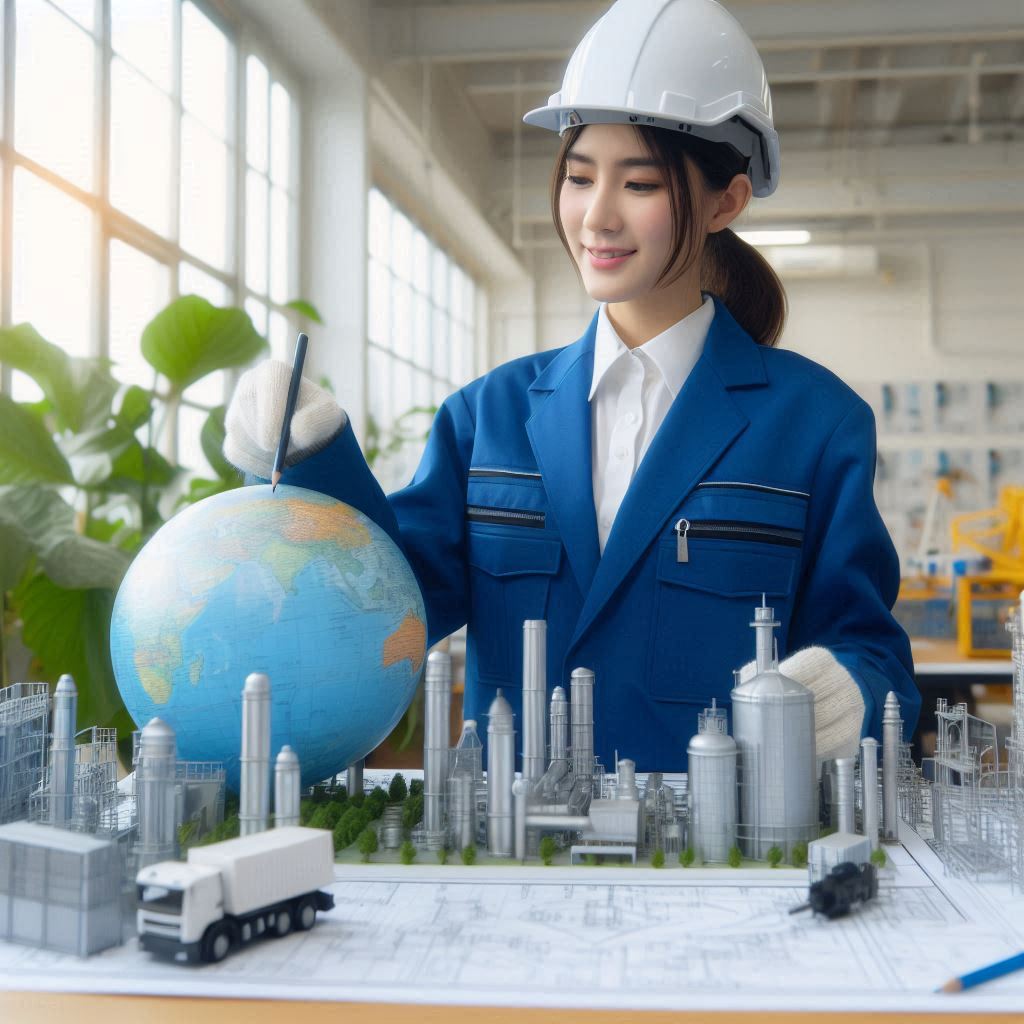Introduction
Staying updated in the environmental engineering field is crucial for success and innovation.
The field constantly evolves due to rapid technological advancements and changing regulations.
Environmental engineers must keep up with these changes to remain effective and compliant.
Technological developments drive significant progress in environmental engineering.
Innovations like advanced sensors, data analytics, and new materials enhance our ability to monitor and mitigate environmental impacts.
These technologies offer better solutions for pollution control, resource management, and sustainability efforts.
Engineers who stay current with these developments can implement cutting-edge solutions that benefit society and the environment.
Regulations in environmental engineering are also dynamic.
Governments and international bodies frequently update standards and policies to address emerging environmental challenges.
Staying informed about these changes ensures compliance and helps engineers anticipate future trends.
Understanding regulatory shifts allows engineers to design projects that meet current requirements and future-proof their work.
In this blog post, we will provide practical tips for staying updated in the environmental engineering field.
We will explore ways to keep abreast of technological advancements and regulatory changes.
We will also discuss the importance of continuous learning and professional development.
First, we will discuss the role of professional organizations and industry associations.
Joining these groups provides access to the latest research, publications, and events.
Membership in professional organizations offers networking opportunities with experts and peers.
Attending conferences, workshops, and seminars can provide valuable insights into emerging trends and best practices.
Join Professional Associations
Benefits of Joining Organizations Such as the American Society of Civil Engineers or the Society of Environmental Engineers
Joining professional associations offers numerous benefits for environmental engineers.
Organizations like the American Society of Civil Engineers (ASCE) and the Society of Environmental Engineers (SEE) provide valuable resources.
These associations create opportunities for professional growth and development.
Access to Conferences, Workshops, and Networking Opportunities
Members gain access to conferences, workshops, and seminars.
These events cover the latest trends and advancements in environmental engineering.
Attending conferences allows engineers to learn from experts in the field.
Workshops offer hands-on experience with new technologies and methodologies.
Seminars provide insights into emerging research and innovations.
Networking opportunities are another significant advantage.
Professional associations connect engineers with peers, mentors, and industry leaders.
Building a strong professional network can lead to career advancement.
Networking helps engineers stay informed about job openings and project collaborations.
Engaging with a community of professionals fosters knowledge exchange and support.
Stay Informed on the Latest Trends and Advancements in the Field
Staying informed on the latest trends is crucial in environmental engineering.
Professional associations often publish journals and newsletters.
These publications feature cutting-edge research, case studies, and industry news.
Reading these materials helps engineers stay updated on new developments.
Subscribing to association newsletters ensures engineers receive timely updates.
Professional associations also offer continuing education opportunities.
Many associations provide online courses and certification programs.
These educational resources help engineers expand their skills and knowledge.
Earning certifications can enhance an engineer’s credentials and career prospects.
Membership in professional associations demonstrates a commitment to the field.
Employers recognize and value active participation in industry organizations.
Being a member of ASCE or SEE can make a resume stand out.
It shows dedication to professional growth and staying current with industry advancements.
In addition to individual benefits, professional associations contribute to the broader industry.
They advocate for policies and regulations that support environmental engineering.
Members can participate in committees and working groups to influence industry standards.
Engaging in advocacy efforts helps engineers contribute to positive change.
Why Joining Professional Associations is Essential for Environmental Engineers
Joining a professional association is a valuable step for any environmental engineer.
It offers access to resources, networking, and educational opportunities.
Staying informed about the latest trends and advancements is essential for career success.
Active participation in associations demonstrates dedication to the field and professional growth.
In essence, joining professional associations like ASCE and SEE is highly beneficial for environmental engineers.
These organizations provide access to valuable resources, including conferences, workshops, and networking opportunities.
Staying informed about the latest trends and advancements is crucial for career success.
Engaging with a community of professionals fosters knowledge exchange and support.
Membership in professional associations also demonstrates a commitment to the field and contributes to industry advocacy efforts.
By joining these associations, environmental engineers can enhance their skills, expand their network, and stay updated on industry developments.
Read: The Role of NCARB in US Architecture Licensing.
Subscribe to Industry Publications
Importance of Subscribing to Journals, Magazines, and Newsletters Specific to Environmental Engineering
Subscribing to industry publications is essential for staying updated in environmental engineering.
These resources provide the latest research, case studies, and best practices.
They offer valuable insights into emerging trends and technologies.
Subscribing to journals, magazines, and newsletters specific to environmental engineering ensures you remain informed about the field’s advancements.
Examples of Popular Publications such as Environmental Science & Technology or Water Environment Research
Journals are a critical resource for environmental engineers.
They publish peer-reviewed research that contributes to scientific knowledge.
Subscribing to journals like Environmental Science & Technology keeps you informed about groundbreaking research.
This journal covers various topics, including environmental chemistry, pollution control, and sustainable engineering solutions.
Regularly reading such journals helps you stay ahead in your field.
Magazines also play a vital role in keeping you updated.
They provide more accessible content than academic journals.
Magazines often include articles on current issues, industry news, and professional development tips.
Water Environment Research is a notable magazine in environmental engineering.
It covers wastewater treatment, water quality, and environmental management.
Subscribing to this magazine ensures you receive the latest information on water-related environmental engineering.
Newsletters are another excellent resource.
They deliver regular updates directly to your inbox.
Subscribing to newsletters from professional organizations keeps you informed about industry events, webinars, and conferences.
Organizations like the American Academy of Environmental Engineers and Scientists (AAEES) offer newsletters packed with relevant information.
These newsletters help you stay connected with the environmental engineering community.
Regular Updates on Research, Case Studies, and Best Practices
Regular updates on research are crucial for environmental engineers.
Staying current with research helps you apply the latest findings to your work.
Journals and magazines publish case studies that showcase successful projects and innovative solutions.
These case studies provide practical insights that you can implement in your projects.
Subscribing to industry publications ensures you have access to these valuable resources.
Best practices are continually evolving in environmental engineering.
Subscribing to industry publications helps you stay updated on these changes.
Journals, magazines, and newsletters highlight best practices through articles, reports, and case studies.
They provide guidance on implementing the most effective and sustainable engineering solutions.
Regularly reading these publications keeps you informed about the latest best practices in the field.
In summary, subscribing to industry publications is vital for staying updated in environmental engineering.
Journals like Environmental Science & Technology provide access to cutting-edge research.
Magazines like Water Environment Research offer insights into current issues and professional development.
Newsletters from professional organizations keep you connected with the industry.
Regular updates on research, case studies, and best practices ensure you stay ahead in your field.
By subscribing to these resources, you can maintain your knowledge and continue to excel in environmental engineering.
Follow Key Influencers and Thought Leaders
Importance of Following Influential Figures in the Environmental Engineering Field
Following key influencers and thought leaders in environmental engineering is crucial.
These individuals provide valuable insights, industry trends, and innovative ideas.
Staying updated through their knowledge can significantly enhance your understanding and expertise.
Tips on Identifying Thought Leaders Through Social Media, Blogs, and Publications
Identify thought leaders by researching top professionals in environmental engineering.
Look for individuals who regularly contribute to significant advancements in the field.
They often hold leadership positions in respected organizations or academic institutions.
Social media platforms like LinkedIn and Twitter are excellent for finding thought leaders.
Follow their profiles to access their posts, articles, and opinions.
Engage with their content by commenting and sharing your thoughts.
This interaction can help you gain visibility and build connections.
Blogs and publications are also valuable sources for identifying thought leaders.
Many experts maintain personal blogs where they share in-depth analyses and case studies.
Subscribe to these blogs to receive updates directly in your inbox.
Additionally, follow renowned publications and journals that feature articles by prominent figures.
Industry conferences and webinars offer another way to connect with influencers.
Attend these events to hear them speak on critical topics and emerging trends.
Networking at these events can provide opportunities to ask questions and engage in discussions.
Keep Abreast of Their Insights, Opinions, and Recommendations
Pay attention to the topics influencers focus on.
They often highlight pressing issues and groundbreaking research.
Their insights can guide your learning and professional development.
For example, if a thought leader emphasizes the importance of sustainable practices, you can explore related courses and certifications.
Regularly read and analyze the content shared by influencers.
Their opinions can shape your perspective and broaden your understanding.
They often provide practical recommendations and actionable strategies.
Implementing these can improve your work and keep you ahead in the field.
Join professional groups and forums where these thought leaders are active.
Platforms like LinkedIn Groups and specialized forums facilitate discussions on environmental engineering topics.
Participating in these communities can help you stay updated and network with like-minded professionals.
Use tools like Google Alerts to track content from key influencers.
Set up alerts for their names or specific topics they cover.
This way, you will receive notifications whenever they publish new content or are mentioned in the media.
Keeping abreast of influencers’ insights requires consistency.
Dedicate time each week to review their updates and reflect on their implications.
Incorporate their recommendations into your projects and research.
This practice ensures you remain at the forefront of developments in environmental engineering.
Generally, following key influencers and thought leaders is essential for staying updated in environmental engineering.
Utilize social media, blogs, publications, conferences, and professional groups to identify and engage with them.
Regularly consuming their content will enhance your knowledge and keep you informed about industry trends and innovations.
Read: 5 Essential Software Tools Every US Architect Uses.
Attend Professional Development Workshops
Benefits of Attending Workshops, Seminars, and Webinars on Environmental Engineering Topics
Attending professional development workshops benefits environmental engineers in many ways.
Workshops, seminars, and webinars provide invaluable opportunities to learn new skills.
These events often focus on the latest technologies and methodologies.
Engaging in these workshops helps engineers stay ahead of industry trends.
Opportunities to Learn New Skills, Technologies, and Methodologies
Workshops offer hands-on learning experiences.
Environmental engineers can practice new techniques in a controlled environment.
This practical experience is essential for skill development.
Seminars and webinars, on the other hand, often feature industry experts.
These experts share their insights and experiences, providing a wealth of knowledge.
Learning new technologies is crucial in environmental engineering.
Workshops often introduce the latest tools and software.
These tools can improve efficiency and accuracy in various tasks.
For example, new modeling software can enhance environmental impact assessments.
By mastering these tools, engineers can offer better solutions to their clients.
Workshops also cover new methodologies in the field.
These methodologies can lead to more sustainable practices.
Engineers can learn about the latest research findings.
Applying these findings can help reduce environmental impact. This knowledge is critical in an industry that constantly evolves.
Stay Ahead of Industry Trends and Advancements
Staying ahead of industry trends is another significant benefit.
Workshops and seminars often highlight emerging trends.
Knowing these trends can provide a competitive edge.
Engineers can anticipate changes and adapt quickly.
This proactive approach is vital for long-term success.
Networking is another key advantage of attending these events.
Workshops and seminars gather professionals from various backgrounds.
This diversity can lead to meaningful connections.
Engineers can share ideas and collaborate on projects.
These connections can also open doors to new opportunities.
Webinars are particularly convenient for busy professionals.
They offer flexibility, allowing engineers to learn at their own pace.
Many webinars are available on-demand, fitting into any schedule.
This accessibility ensures that engineers can continue their education without disrupting their work.
Professional development workshops also contribute to career advancement.
Employers value continuous learning and skill enhancement.
Attending workshops demonstrates a commitment to personal growth.
This dedication can lead to promotions and salary increases.
These events often provide certifications upon completion.
These certifications are valuable additions to a resume.
They validate the skills and knowledge acquired.
Employers recognize the importance of these credentials.
They can enhance job prospects and professional credibility.
In summary, attending professional development workshops, seminars, and webinars offers numerous benefits.
Environmental engineers can learn new skills, technologies, and methodologies.
Staying ahead of industry trends ensures long-term success.
Networking opportunities can lead to collaborations and career advancements.
Certifications from these events enhance professional credibility.
Engaging in continuous learning is essential in the ever-evolving field of environmental engineering.
Read: US Tech Hubs Beyond Silicon Valley: Emerging Cities
Transform Your Career Today
Unlock a personalized career strategy that drives real results. Get tailored advice and a roadmap designed just for you.
Start Now
Pursue Continuing Education
Importance of Pursuing Continuing Education Courses, Certifications, and Degrees
Pursuing continuing education is crucial in the field of environmental engineering.
Staying updated through courses, certifications, and degrees enhances your expertise.
This commitment to learning helps you keep pace with the rapidly evolving industry.
Continuing education courses offer targeted knowledge in specialized areas of environmental engineering.
These courses cover topics such as water resources management, air quality control, and sustainable design.
Enrolling in these courses sharpens your skills and broadens your understanding of current practices.
Certifications validate your proficiency in specific areas and boost your professional credibility.
For example, obtaining a LEED certification demonstrates your expertise in green building practices.
Similarly, a Certified Environmental Professional (CEP) credential highlights your comprehensive knowledge of environmental regulations and best practices.
These certifications set you apart from your peers and increase your career advancement opportunities.
Advanced degrees provide a deeper dive into environmental engineering subjects.
Pursuing a master’s or doctoral degree can open doors to research, teaching, and leadership roles.
These programs offer in-depth knowledge, advanced research opportunities, and the chance to specialize in areas like environmental policy or remediation technology.
Enhance Your Knowledge and Skills in Specialized Areas of Environmental Engineering
Continuing education ensures you remain compliant with industry standards and regulations.
Environmental laws and regulations frequently change to address new challenges and scientific discoveries.
Staying current with these changes is vital for your career.
Understanding and implementing updated regulations helps you avoid legal issues and ensures your projects meet compliance requirements.
Pursuing continuing education also fosters innovation.
By learning about the latest technologies and methodologies, you can bring new ideas to your projects.
This knowledge can lead to more efficient processes, cost savings, and improved environmental outcomes.
Innovation is key to addressing complex environmental issues and achieving sustainable development goals.
Engaging in continuing education also enhances your professional network.
Attending courses, workshops, and conferences connects you with other professionals in the field.
These interactions can lead to collaborations, mentorship opportunities, and the sharing of best practices.
A strong professional network is invaluable for career growth and staying informed about industry trends.
Ensure Compliance with Industry Standards and Regulations
Many organizations support continuing education for their employees.
They may offer tuition reimbursement, professional development programs, or time off for study.
Take advantage of these opportunities to advance your knowledge and skills.
Demonstrating a commitment to continuing education can also make you a more attractive candidate for promotions and new job opportunities.
In summary, pursuing continuing education is essential for staying updated in environmental engineering.
It enhances your knowledge, skills, and professional credibility.
It ensures compliance with industry standards and fosters innovation.
Engaging in ongoing learning opportunities supports career growth and professional networking.
Make continuing education a priority to remain competitive and effective in the ever-evolving field of environmental engineering.
Read: From Intern to Lead: Climbing the Software Ladder in the US
Utilize Online Resources
Explore Online Platforms
Utilize online platforms like LinkedIn groups, forums, and webinars to stay informed.
LinkedIn groups offer a space to connect with environmental engineering professionals.
Joining these groups provides access to valuable discussions and insights.
Engage with a Virtual Community
Engage with a virtual community of environmental engineering professionals.
Participate in discussions, share knowledge, and ask questions.
Online forums dedicated to environmental engineering can be beneficial.
These forums allow you to interact with peers and experts in the field.
Stay Updated on Current Discussions
Stay updated on current discussions by following industry-specific groups and pages on LinkedIn.
Regularly check for new posts and comments.
Participating in these discussions helps you stay informed about the latest trends and challenges in environmental engineering.
Access Job Opportunities
Access job opportunities by joining online job boards and career groups.
LinkedIn and other platforms often post job openings specific to environmental engineering.
Regularly check these platforms to find new job opportunities.
Industry News
Keep up with industry news by following relevant pages and subscribing to newsletters.
Many professional organizations and companies share updates and news about environmental engineering.
Subscribing to their newsletters ensures you receive the latest information directly in your inbox.
Participate in Webinars
Participate in webinars hosted by experts in the field.
Webinars offer an excellent opportunity to learn about new research, technologies, and best practices.
Many organizations host free webinars, making it easy to stay updated.
Join Professional Associations
Join professional associations related to environmental engineering.
Many associations offer online resources, including webinars, forums, and newsletters.
Being a member provides access to a wealth of information and networking opportunities.
Utilize Online Courses
Utilize online courses to enhance your knowledge and skills.
Platforms like Coursera, edX, and Udemy offer courses on various environmental engineering topics.
Taking these courses helps you stay updated with the latest advancements in the field.
Follow Influential Professionals
Follow influential professionals in environmental engineering on social media.
Many experts share their insights, research, and experiences.
Following them provides a continuous stream of valuable information.
Use Online Libraries
Use online libraries and databases to access research papers and articles.
Websites like Google Scholar and ResearchGate offer access to a vast collection of academic publications.
Reading these papers helps you stay informed about the latest research and developments.
Engage in Online Discussions
Engage in online discussions by commenting on blog posts and articles.
Sharing your thoughts and opinions can lead to valuable conversations.
It also helps you connect with other professionals who share your interests.
Leverage Social Media
Leverage social media to stay updated with the latest news and trends.
Platforms like Twitter and Facebook often have pages and groups dedicated to environmental engineering.
Following these pages keeps you informed about the latest developments.
Generally, utilizing online resources is crucial for staying updated in the environmental engineering field.
Engaging with virtual communities, participating in webinars, and accessing online courses enhance your knowledge and skills.
Stay active on social media and follow industry news to remain informed about the latest trends and opportunities.
Participate in Conferences and Events
Attending conferences, symposiums, and trade shows is crucial in the environmental engineering field
Conferences and events serve as a platform for knowledge exchange and professional development in environmental engineering.
These gatherings bring together experts, practitioners, and enthusiasts from around the world to share their experiences, research findings, and best practices.
By participating in such events, you not only stay updated on the latest developments in the field but also gain valuable insights that can enhance your work and research.
Network with industry professionals, researchers, and policymakers
One of the key benefits of attending conferences is the opportunity to network with industry professionals, researchers, and policymakers.
Building connections with like-minded individuals can open doors to collaboration, mentorship, and career opportunities.
By engaging in conversations with experts in the field, you can gain new perspectives, exchange ideas, and stay informed on the current challenges and opportunities in environmental engineering.
Stay informed on cutting-edge technologies, research findings, and industry trends
Another advantage of attending conferences and events is the exposure to cutting-edge technologies and research findings.
Many conferences feature keynote presentations, panel discussions, and technical sessions that showcase the latest innovations and advancements in the field.
By staying updated on new technologies and research developments, you can incorporate these insights into your own work and stay competitive in the rapidly evolving field of environmental engineering.
In addition to networking and gaining knowledge, conferences and events also offer opportunities for professional growth and recognition.
Presenting your research, participating in workshops, and sharing your expertise with other attendees can help you establish yourself as an authority in the field.
By actively engaging in discussions and contributing to the conversation, you can raise your profile, build credibility, and position yourself as a thought leader in environmental engineering.
Overall, participating in conferences, symposiums, and trade shows is essential for staying updated and informed in the environmental engineering field.
These events provide a platform for knowledge exchange, networking, and professional development that can help you advance your career, enhance your skills, and make a positive impact on the environment.
Transform Your Career Today
Unlock a personalized career strategy that drives real results. Get tailored advice and a roadmap designed just for you.
Start NowConclusion
Staying updated in the environmental engineering field is crucial for professional growth and success.
By keeping abreast of the latest trends, technologies, and regulations, professionals can stay ahead of the curve.
One effective way to stay updated is by regularly attending conferences, workshops, and seminars.
These events provide opportunities to network with peers, learn from experts, and gain insights into emerging trends.
Reading industry publications, research papers, and journals is another valuable way to stay informed.
Subscribing to newsletters and following relevant social media accounts can also help professionals stay updated on the latest developments in the field.
Engaging in online courses and webinars can be beneficial for professionals looking to enhance their skills and knowledge.
Continuous learning is essential in an ever-evolving industry like environmental engineering.
Collaborating with colleagues, participating in professional organizations, and seeking mentorship can also contribute to staying updated in the field.
Sharing experiences, best practices, and lessons learned can help professionals stay current and informed.
Implementing the outlined tips can lead to professional growth, career advancement, and increased job satisfaction in the environmental engineering field.
Embracing continuous learning and adaptation is key to thriving in this dynamic industry.




